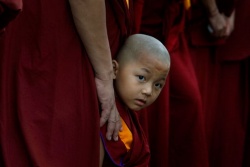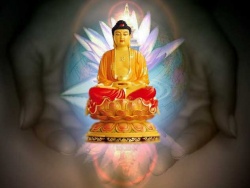Right effort
Right effort (sammā vāyāma) is the sixth step on the Buddha’s Noble Eightfold Path. Effort is the catalyst that brings the other qualities on the path into being and then animates them.
Thus, for example, although we all have the potential to be mindful we may never have been until we heard about it and appreciated its value and utility. We might then make an effort to be mindful and become so.
Having become mindful, at least for a while, we might then try to strengthen this ability and the depth of our mindfulness.
Effort, determination and vigor are essential in every step of this process.
The Buddha defined Right Effort like this: ‘And what is Right Effort? One generates the desire to prevent the arising of unskilful states not yet arisen, the desire to give up unskilful states already arisen, the desire to develop skilful states not yet arisen and the desire to nurture and further develop skilful states already arisen. One makes an effort, exerts energy, focuses and directs the mind to these ends.’ (D.II,131).
However, the Buddha always pointed out that simply gritting one’s teeth and straining can sometimes be counter-productive. Effort is to exert energy but Right Effort is more subtle and nuanced than that.
In fact, Right Effort is a little like rowing a boat. To get the boat where one wants to go is not simply a matter of pulling at the oars.
Firstly the oars have to be pulled in unison. When we are going against the current we may really have to pull hard, when going with the current we may not have to pull at all. To keep going in the right direction we might only have to pull on the left oar and at other times only on the right one.
Thus to be ‘right,’ effort has to be balanced against other factors, its intensity must be adjusted according to circumstances and we have to know when to relax and let things unfold naturally. As the Buddha said, if you try too hard you get agitated and if you do not try hard enough, you stagnate (S.I,1).
Right effort (samyag-vyāyāma / sammā-vāyāma) can also be translated as "right endeavor" or "right diligence". In this factor, the practitioners should make a persisting effort to abandon all the wrong and harmful thoughts, words, and deeds.
The practitioner should instead be persisting in giving rise to what would be good and useful to themselves and others in their thoughts, words, and deeds, without a thought for the difficulty or weariness involved. In the Chinese and Pali Canon, it is explained thus:
And what, monks, is right effort?
(i) There is the case where a monk generates desire, endeavors, activates persistence, upholds and exerts his intent for the sake of the non-arising of evil, unskillful qualities that have not yet arisen.
(ii) He generates desire, endeavors, activates persistence, upholds and exerts his intent for the sake of the abandonment of evil, unskillful qualities that have arisen.
(iii) He generates desire, endeavors, activates persistence, upholds and exerts his intent for the sake of the arising of skillful qualities that have not yet arisen.
(iv) He generates desire, endeavors, activates persistence, upholds and exerts his intent for the maintenance, non-confusion, increase, plenitude, development, and culmination of skillful qualities that have arisen:
This, monks, is called right effort.
Although the above instruction is given to the male monastic order, it is also meant for the female monastic order and can be practiced by lay followers of both genders.
The above four phases of right effort mean to:
Prevent the unwholesome that has not yet arisen in oneself.
Let go of the unwholesome that has arisen in oneself.
Bring up the wholesome that has not yet arisen in oneself.
Maintain the wholesome that has arisen in oneself.
Right effort (sammà vàyàma) is the sixth step on the Buddha’s Noble Eightfold Middle Path. Effort is the catalyst that brings the other qualities on the path into being and then animates them.
Thus, for example, although we all have the potential to be mindful we may never have been until we heard about it and appreciated its value and utility. We might then make an effort to be mindful and become so.
Having become mindful, at least for a while, we might then try to strengthen this ability and the depth of our mindfulness. Effort, determination and vigour are essential in every step of this process.
The Buddha defined Right Effort like this. ‘And what is Right Effort? One generates the desire to prevent the arising of unskilful states not yet arisen, the desire to give up unskilful states already arisen, the desire to develop skilful states not yet arisen and the desire to nurture and further develop skilful states already arisen. One makes an effort, exerts energy, focuses and directs the mind to these ends’ (D.II,131).
However, the Buddha always pointed out that simply gritting one’s teeth and straining can sometimes be counter- productive. Effort is to exert energy but Right Effort is more subtle and nuanced than that.
In fact, Right Effort is a little like rowing a boat. To get the boat where one wants to go is not simply a matter of pulling at the oars. Firstly the oars have to be pulled in unison.
When we are going against the current we may really have to pull hard, when going with the current we may not have to pull at all.
To keep going in the right direction we might only have to pull on the left oar and at other times only on the right one.
Thus to be ‘right,’ effort has to be balanced against other factors, its intensity must be adjusted according to circumstances and we have to know when to relax and let things unfold naturally.
As the Buddha said, if you try too hard you get agitated and if you do not try hard enough you stagnate (S.I,1).
The energetic will to prevent evil and unwholesome states of mind from arising. This has to do with the drive of the practitioner to seek to do good and reach insights of enlightenment.
Two key words that best describe how the Buddha obtained enlightenment are persistence and determination. President Calvin Coolidge (30th president of the U.S.) had the following to say about persistence and determination:
“Nothing in the world can take the place of persistence. Talent will not; nothing is more common than the unsuccessful man with talent. Genius will not; un-rewarded genius is almost a proverb. Education will not -- the world is full of educated derelicts. Persistence and determination are omnipotent.”
The above quote is not saying that genius and education do not produce success. The important point of the quote is that none of these traits ensure success like persistence and determination.
“Therein, bhikkhus, the meditator who is both a thorough worker and a persistent worker regarding concentration is the chief . . . the most excellent of the kinds of meditators.” Samyutta Nikaya 34.53
There was a report on a news show recently about the most intelligent person in America.
He had an I.Q. score off the charts. The number was “somewhere above 200” since he had no wrong answers, the testers do not know where the exact score is, it is so high. This person lives in a small house, barely making ends meet, working as a bouncer in a bar.
Intelligence or I.Q. only shows what you are capable of. If you do not go to school or use your intelligence you can still be quite ignorant. Knowledge and wisdom must be attained, intelligence just gives you an idea of how fast you could absorb material, not how “smart” or “wise” you really are.
If you watch, hear, or read about many different famous business peoples’ biographies such as Donald Trump or Bill Gates, more than education or intelligence you find the common characteristics of not just hard work, but persistence and determination.
Another couple of examples are in the field of sports. There are many world class athletes who made it to the top after numerous failures. They simply persisted and with determination, became champions.
The Ethiopian distance runner, Haile Gebrselassie, finished 99th place in his first marathon race.
He later went on to win gold medals in the 1996 and 2000 Olympics. Michael Jordan, the famous basketball player was cut (rejected) from his high school basketball team. In the NBA league, he won six championships and broke several records.
Determination is the firm decision to do something. You have set yourself a goal and you really go for it. The Buddha sat under the Bodhi tree and vowed not to get up for anything until he was enlightened.
He did not care if his “legs fell off” or even if he died. This is determination. Persistence is the effort to go for it, to keep at it in spite of obstacles that may arise. They are very related and that is why they are usually referred to in conversation and writing together.
We all have experienced this in some form or another. Maybe it is something as simple as wanting to get an “A” grade on some test in school or college.
We put all our effort into studying and especially the night before the test we stay up and cram for hours. The goal is set and the effort is put in to reach the goal. Someone may call you or there might be some other distraction. You put off or ignore the distraction and continue with your studies.
In meditation practice there can be many distractions, from pain in the legs, to your mind wandering so much that it bothers you and stops you from meditating.
Persistence is working through these obstacles anyway. Obstacles always arise in any endeavor. The more valuable the goal, it seems, the more obstacles that come up. Right Effort is this drive of persistence and determination.








